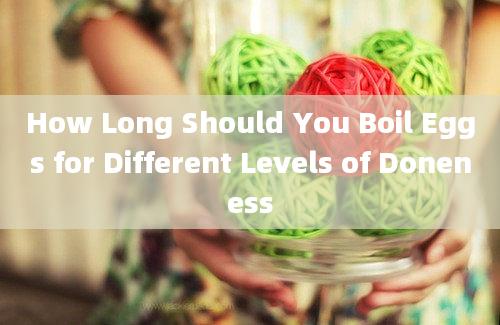How Long Should You Boil Eggs for Different Levels of Doneness

Boiling eggs is a simple task, yet achieving the perfect level of doneness can be tricky. Whether you prefer a softboiled egg with a runny yolk or a hardboiled egg for your salad, understanding the optimal boiling times is crucial. This article delves into the science behind boiling eggs and provides precise timings for different levels of doneness, backed by authoritative sources.
The Science of Boiling Eggs
Eggs are composed of proteins that coagulate at different temperatures. The whites begin to set at around 63掳C (145掳F), while the yolks start to solidify at approximately 70掳C (158掳F) [1]. The time it takes for these proteins to fully coagulate determines the level of doneness.
Boiling Times for Different Levels of Doneness
1. SoftBoiled Eggs (Runny Yolk)
3 minutes: The whites are set, and the yolk is completely runny.
45 minutes: The whites are fully set, and the yolk is still runny but slightly thicker.
2. MediumBoiled Eggs (Soft but Firm Yolk)
67 minutes: The yolk is soft but has a more custardlike consistency.
3. HardBoiled Eggs (Fully Set Yolk)
912 minutes: The yolk is fully set and slightly creamy.
1215 minutes: The yolk is completely solid and may show a greenish ring around the edge, indicating overcooking [2].
Tips for Perfect Boiled Eggs
Start with Room Temperature Eggs: Eggs straight from the fridge may crack due to thermal shock.
Use a Timer: Precision is key to achieving the desired level of doneness.
Ice Bath: After boiling, plunge the eggs into an ice bath to stop the cooking process and prevent overcooking [3].
Sources
1. [American Egg Board Egg Science](https://www.incredibleegg.org/eggscience/)
2. [Serious Eats The Food Lab: How to Boil Eggs Perfectly Every Time](https://www.seriouseats.com/2014/12/thefoodlabhowtoboileggsperfectlyeverytime.html)
3. [Culinary Institute of America Techniques of Cooking Eggs](https://www.ciaprochef.com/eggs/techniques.html)
Frequently Asked Questions (FAQs)
Q1: How long should I boil eggs for a runny yolk?
A1: For a runny yolk, boil the eggs for 35 minutes. At 3 minutes, the yolk will be completely runny, while at 45 minutes, it will be slightly thicker but still runny.
Q2: What is the ideal boiling time for a soft but firm yolk?
A2: Boil the eggs for 67 minutes to achieve a soft but firm yolk, resembling a custardlike consistency.
Q3: How long do I need to boil eggs for a fully set yolk?
A3: For a fully set yolk, boil the eggs for 912 minutes. This will result in a yolk that is firm yet slightly creamy.
Q4: Can I boil eggs for more than 15 minutes?
A4: Boiling eggs for more than 15 minutes is not recommended as it can lead to overcooking, causing the yolk to develop a greenish ring and become rubbery.
Q5: Should I start with cold or room temperature eggs?
A5: It's best to start with room temperature eggs to avoid cracking due to thermal shock. If using cold eggs, let them sit at room temperature for about 20 minutes before boiling.
Q6: Why do I need to use an ice bath after boiling eggs?
A6: An ice bath stops the cooking process immediately, preventing the eggs from overcooking and ensuring the desired level of doneness.
Q7: How can I prevent eggs from cracking while boiling?
A7: To prevent cracking, use room temperature eggs, gently lower them into the water, and avoid rapid temperature changes. Adding a teaspoon of salt to the water can also help.
Q8: What is the green ring around the yolk, and how can I avoid it?
A8: The green ring is caused by overcooking, resulting from a reaction between the iron in the yolk and the sulfur in the white. To avoid it, do not boil eggs for more than 1215 minutes and use an ice bath afterward.
Q9: Can I boil eggs in advance and reheat them?
A9: Yes, you can boil eggs in advance. Store them in the refrigerator and reheat them by placing them in boiling water for a few minutes to warm through.
Q10: Is it necessary to use a timer when boiling eggs?
A10: Yes, using a timer is crucial for achieving precise levels of doneness. Even a minute can make a significant difference in the texture of the yolk.
By following these guidelines and understanding the science behind boiling eggs, you can consistently achieve the perfect level of doneness for your culinary needs.









